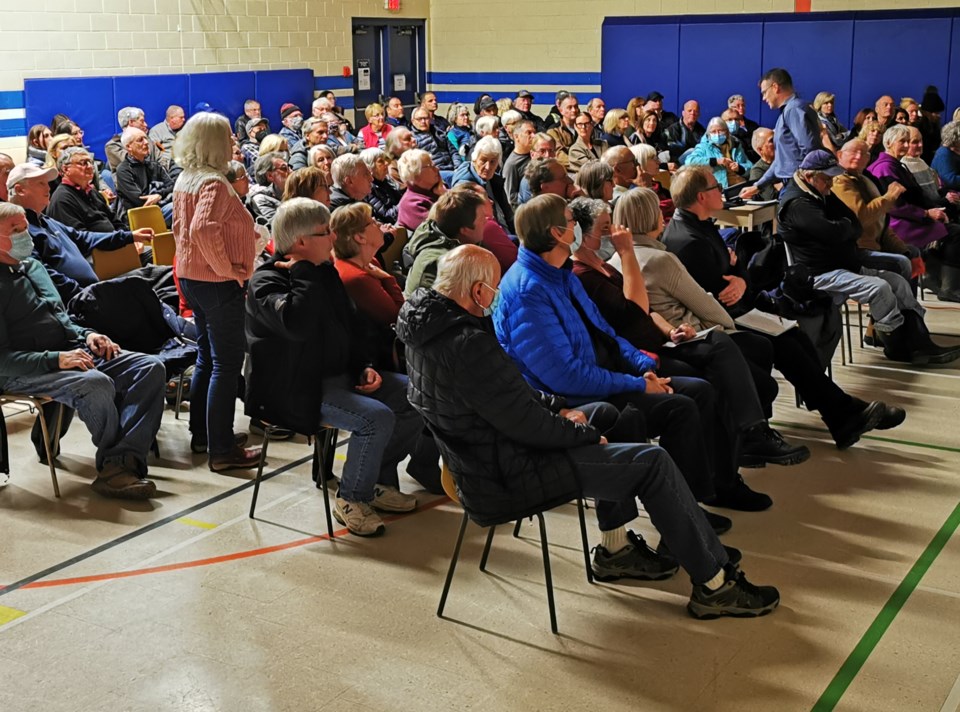While there has been no official declaration, Oro-Medonte Township’s war with the City of Barrie is on.
At a standing-room-only town-hall event Monday night, hosted by Ward 3 Coun. David Clark at Shanty Bay Public School, Oro-Medonte Deputy Mayor Peter Lavoie encouraged residents to stay on top of the conversations surrounding Barrie’s proposed boundary expansion plans. The city says it needs hundreds of hectares of employment land from neighbouring Oro-Medonte and Springwater townships for industrial development.
“It’s important to maintain dialogue, even with your enemy,” Lavoie said. "That’s how the mayor and I see it at this point and we will continue to do so.”
While Oro-Medonte doesn’t see any sort of viable partnership with the City of Barrie in the offing, the township does believe ongoing discussion is important, because it doesn’t want to cede control of its future to another municipality.
“If we walk away from the table, Barrie’s going to go to the province and say no one’s co-operating with us,” Oro-Medonte Mayor Randy Greenlaw told the audience. “What we’re trying to say is this is not a partnership, it is not advantageous to Oro-Medonte.
“We are open to discussion but this is not the right plan,” he added.
Barrie Mayor Alex Nuttall has asked Municipal Affairs and Housing Minister Paul Calandra to consider his request for more employment land, as reported Tuesday evening on BarrieToday.
Meanwhile, Greenlaw said he and Lavoie have been actively seeking meetings with Premier Doug Ford and Calandra to discuss what Greenlaw says is little more than “a land grab” by Barrie.
Greenlaw said a delegation from Oro-Medonte met with former housing minister Steve Clark in April and one of the topics broached at that meeting was boundary expansion. According to Greenlaw, Clark said the province had no interest in getting into boundary readjustments. They want the municipalities to solve it themselves.
“What we need to know is where does the government stand on that issue today versus seven or eight months ago,” Greenlaw said. “Until we get that clarity, we’re in a better position not making a decision.”
Greenlaw was asked what would he would do if a decision was due today.
“We would actually align ourselves with Simcoe County,” he said. “The county’s vision is to have industrial development along the major highways and corridors.”
Oro-Medonte council has identified the area around Highway 11 and Line 7 — about halfway between Barrie and Orillia — as where it would like to focus commercial and industrial development. The township says easy access to a four-lane highway and a regional airport make it the ideal location.
“The county supports our municipality and the direction we’re going,” Greenlaw said. “The county wants development along the Highway 11 corridor, not down Highway 93 going into Blake Street (in Barrie).”
Satisfied the discussion on boundary expansion had run its course for now, Clark took a few minutes to bring the audience up to speed on what was happening with cannabis cultivation in the township.
There are currently three cannabis producers operating in the township: Carmel Cannabis on Line 7 South, Organibis, which hasn’t started production at its Ridge Road location, and Medical Saints on Line 3, an outdoor hemp production facility right beside the Shanty Bay settlement area.
According to Clark, the township passed an interim control bylaw on Nov. 14, 2018 to prohibit the use of any land in the agricultural/rural zone for the purposes of the growing of cannabis and any related activities.
All three of the township’s cannabis producers challenged the interim control bylaw, claiming it didn’t conform with provincial policy. The township reached agreements with two of the producers, Carmel and Organibis, but not Medical Saints.
According to Clark’s review, Ontario's Municipal Act specifically lays out where municipalities can and cannot infringe on the province and the federal government’s laws and actions.
“A bylaw is without effect to the extent of any conflict with, a) a provincial or federal Act or a regulation made under such an Act; or b) an instrument of a legislative nature, including an order, licence or approval, made or issued under a provincial or federal Act or regulation,” he read from the Act.
In essence, he said Oro-Medonte can’t make something illegal that the federal government has made legal.
Greenlaw said advice he received from the Ontario Ministry of Agriculture, Food and Rural Affairs (OMAFRA) supported that opinion.
“I talked with OMAFRA and their opinion is an agricultural crop is an agricultural crop and it can be grown on any land that’s designated agricultural,” Greenlaw said. “They don’t make any distinction between wheat, hay and cannabis. They’re all legal crops.”
That didn’t sit well with the folks who live in proximity to Medical Saints’ farm.
They want Oro-Medonte council to keep up the fight.
The challenge, however, is the fight costs good money — and a lot of it.
According to Greenlaw, the cannabis battle so far has cost the township in excess of $800,000 — all of it coming from taxpayers’ pockets.
“We can’t contradict provincial policy,” Greenlaw said. “We’ve been advised to deal with this issue through setbacks.”
Greenlaw said that’s something he’s interested in exploring.
“If we don’t do anything, we’re out of the process,” Greenlaw said. “At that point, we’re putting the final decision in someone else’s hands.”
Greenlaw said he’s sympathetic to the inconveniences Shanty Bay residents are dealing with and he’s willing to “fight the good fight,” but he needs their help.
“If someone can show me the path from where we are now to where we want to land, a solution that overcomes the current policies and legislation, let me know,” he told the audience. “I can’t see it, but I’ll work with you so we can find a solution.”











